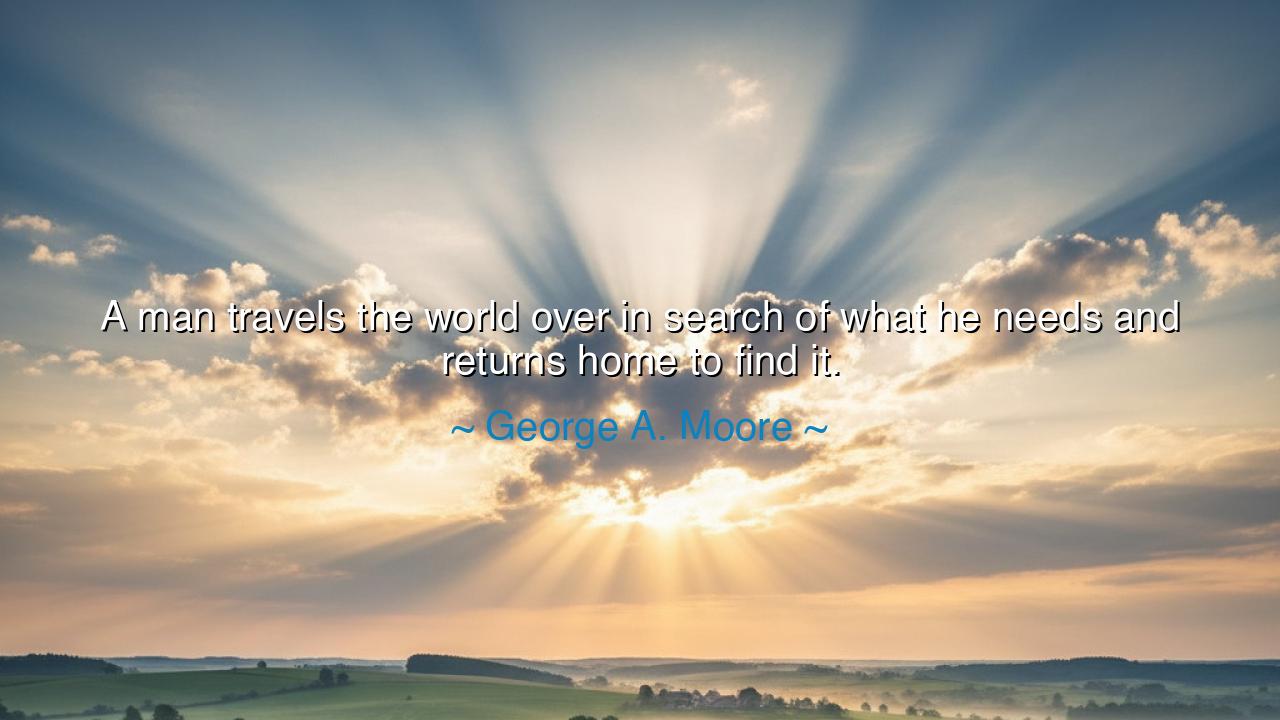
A man travels the world over in search of what he needs and






When George A. Moore wrote, “A man travels the world over in search of what he needs and returns home to find it,” he was speaking not merely of a physical journey, but of the eternal pilgrimage of the human spirit. These words are simple, yet they carry the weight of ages — for they remind us that the treasures we seek in distant lands often lie quietly within our own hearts. The longing that drives a man to wander — to chase fortune, love, wisdom, or peace — is not folly, but destiny. And yet, when his feet grow weary and his soul turns inward, he discovers that what he searched for was always home, waiting patiently for him to see it anew.
The origin of this insight comes from Moore’s own life. Born in Ireland in 1852, he left his homeland to study art in Paris, chasing inspiration among the great painters and thinkers of his time. Yet, after years abroad, he returned to Ireland to write — and in doing so, found his true calling. His journey mirrors his own words: he had to leave to learn, and to wander to understand. The world taught him not what to possess, but how to perceive. His quote captures that sacred paradox — that sometimes we must journey far from what we love to truly know its worth.
In this saying, Moore joins a chorus of ancient voices. For the same truth was sung by Odysseus, who sailed the seas for twenty years, facing monsters, gods, and storms, only to return to the humble hearth of Ithaca, where his heart had always belonged. The hero’s journey, in every culture, ends not in conquest but in homecoming — a return not only to a place, but to the self that has been transformed by the journey. The traveler departs ignorant of his own soul and returns enlightened, realizing that what he sought — meaning, love, peace — was never lost, only unseen.
The meaning of this quote unfolds gently, like dawn. When Moore speaks of “what he needs,” he does not mean what a man desires — wealth, pleasure, or power — but what the soul requires to be whole: understanding, contentment, connection. Many wander the earth believing these things lie elsewhere, in foreign lands, in new faces, or grander dreams. Yet the wise know that the search for happiness outside oneself is like chasing a reflection on water. The journey may be necessary — even noble — but its purpose is not to find something new, but to see with new eyes. The home one returns to, in truth, is the awakened heart.
Consider the life of Mahatma Gandhi, who studied in London, worked in South Africa, and walked among nations before returning to India. He had traveled the world, not to gather riches or fame, but to discover the voice of his own spirit — a voice that had been within him all along. Upon his return, he found his purpose: to lead his people toward freedom through peace. In his journey, as in Moore’s wisdom, the world served as a mirror, reflecting him back to himself. He left his home as a seeker and returned as a knower.
Moore’s words also speak to the modern soul, forever restless, chasing satisfaction through movement — new jobs, new places, new identities. Yet even amidst all this motion, the ancient truth remains: no voyage will grant what the heart has not learned to receive. The real home is not four walls, nor a single place, but a state of harmony between the soul and life. To “return home” is to find rest in one’s own being, to stand still long enough to recognize the beauty that has always been near. The man who can sit beneath his own roof and feel peace has completed the greatest journey of all.
So take this lesson, traveler of life: go, wander, and learn, for the journey will polish the eyes of your heart. But remember always — the end of the search is not found in distant horizons, but in gratitude, in presence, in love. When your striving is done, return — not only to the place of your birth, but to the center of your soul. For there you will find what all wanderers, kings, and poets have sought since the dawn of time: the quiet truth that what you long for has always been home.






AAdministratorAdministrator
Welcome, honored guests. Please leave a comment, we will respond soon